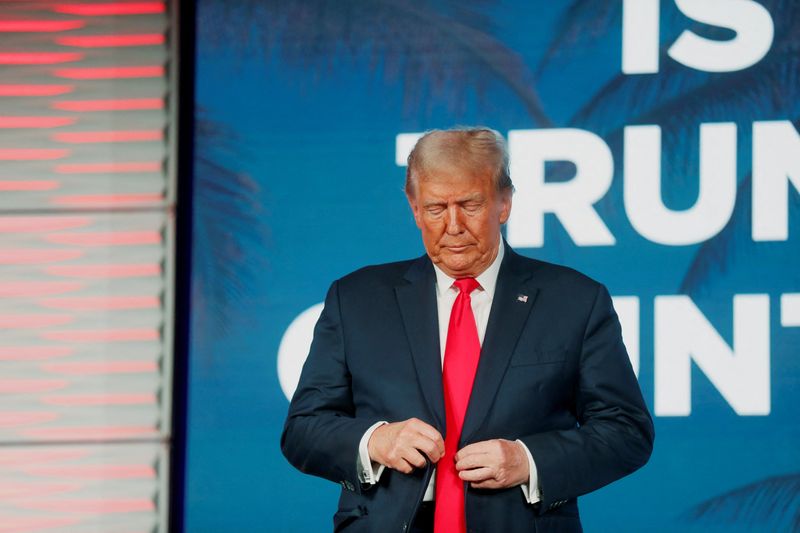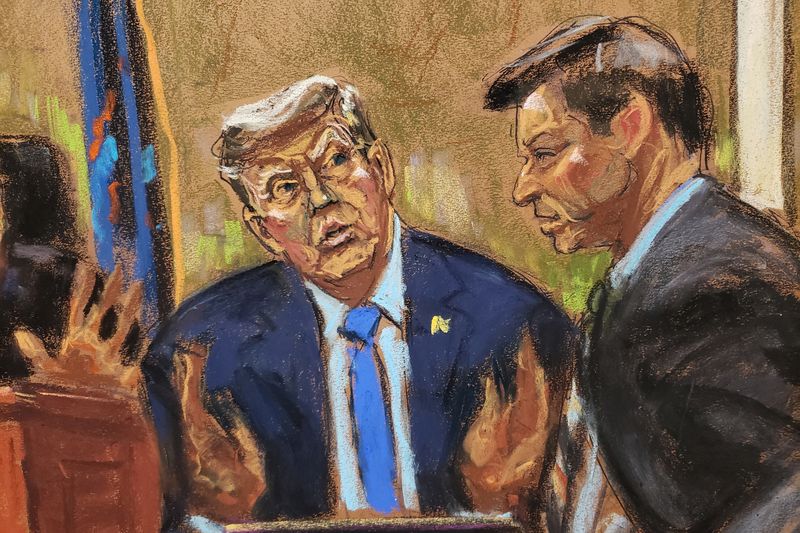By Andrew Goudsward
WASHINGTON (Reuters) -Donald Trump, facing federal criminal charges of attempting to overturn his 2020 election defeat, is seeking to cast a weeks-long campaign to thwart the certification of the vote as political advocacy by a U.S. president alarmed by claims of election fraud.
Trump’s defense lawyers, in a flurry of legal motions, have argued that the case by Special Counsel Jack Smith "attempts to criminalize core political speech and political advocacy."
"President Trump and others have a First Amendment right to state that the election was stolen and advocate for members of Congress and other government officials to act in accordance with that view," Trump lawyers wrote in one court filing.
The filings offer an early glimpse at how Trump plans to defend himself against what prosecutors allege was a multipronged conspiracy to hinder the counting and certification of the results of an election he lost to Democrat Joe Biden.
Prosecutors argued in a Monday court filing that the First Amendment does not protect "fraudulent speech" and that Trump cannot "use so-called advocacy as a cover for his scheme to obstruct a governmental function through deceit."
Trump has pleaded not guilty and accused prosecutors of attempting to interfere in his 2024 presidential campaign, where he holds a commanding lead in opinion polls ahead of Republican nominating contests. The case, in federal court in Washington, is one of four criminal prosecutions against Trump.
Trump continues to falsely blame his 2020 election defeat on widespread voter fraud, despite courts, state audits and members of his former administration affirming the results.
Legal experts say a judge is likely to constrain the arguments Trump will be able to make at trial, which is scheduled to begin in March 2024, but the filings preview some themes of his defense.
"There is a concern here about the uncertain line between advocacy and criminal conduct," said Jonathan Turley, a law professor at George Washington University and frequent witness for Republican lawmakers in Congress.
The indictment alleges that while Trump had a right to legally challenge the results, he took unlawful steps, including setting up slates of fraudulent electors and pressuring then-Vice President Mike Pence to refuse to certify the election results before Congress.
“He’s not charged with anything that makes his political advocacy relevant,” said Ty Cobb, who formerly represented Trump, but has since become critical of the former president. “He can say the election was stolen. He can say the system was corrupt, but he can’t engage in or direct specific illegal conduct.”
'CONTROL YOUR CLIENT'
Throughout his years in the public eye, Trump has cultivated a pull-no-punches persona that was on display on Monday as he testified in a New York state civil fraud trial, where he sparred with Justice Arthur Engoron, ignoring questions and questioning the judge's impartiality.
"Mr Kise, can you control your client? This is not a political rally. This is a courtroom," Engoron said, referring to Trump attorney Christopher Kise.
Trump's political rhetoric is also poised to be a point of contention in the Washington case, where U.S. District Judge Tanya Chutkan has already warned Trump's lawyers about bringing the campaign into the courtroom.
At trial, legal experts say Trump will likely not be allowed to argue to a jury that his conduct was protected by his First Amendment right to free speech because such legal questions are resolved by the judge. However, that argument could form the basis of an appeal if he's convicted.
“Many crimes, certainly a lot of conspiracy crimes, involve the use of words,” said Kristy Parker, counsel at Protect Democracy, an advocacy group that has called for Trump to face legal accountability. “That doesn't mean that those words are protected speech.”
Trump has repeatedly relied on free speech arguments in defending his words ahead of the Jan. 6, 2021, attack on the U.S. Capitol by his supporters and in opposing a partial gag order in the criminal case.
Those claims complement his political case as an anti-establishment crusader whose movement is opposed by powerful foes seeking to silence him.
His lawyers argued in court filings that Trump was allowed to mistrust “establishment-based government officials” who told Trump his fraud claims were untrue. Many of those officials, including former U.S. Attorney General William Barr, were appointed by Trump.
Trump’s lawyers have also hinted they may employ an advice of counsel defense, asserting that Trump relied in good faith on the advice of lawyers.
Criminal defendants can use the defense to argue they sought legal opinions and did not intend to break the law.
But that defense carries its own risks. Prosecutors have already noted that Trump would have to turn over records previously shielded by attorney-client privilege.

Additionally, several lawyers who advised Trump and his campaign after the election have been identified as uncharged co-conspirators in the case and been indicted in a separate criminal case in Georgia.
Three former Trump lawyers have already pleaded guilty in Georgia, including Kenneth Chesebro, who drafted memos crafting the fake elector scheme.
